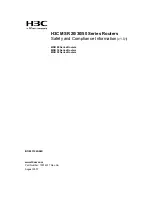
Chapter 3 Configuration Settings and Display
3.3 RAID Group Management > set eco-raid-group
ETERNUS CLI User’s Guide
Copyright 2015 FUJITSU LIMITED
P2X0-1030-09ENZ0
140
set eco-raid-group
This command is used to associate an ECO schedule with a specified RAID group(s).
The ECO mode cannot be used for RAID groups that contain SSDs.
■
Syntax
■
Parameter
■
Example(s)
set eco-raid-group {-rg-number
rg_numbers
| -rg-name
rg_names
}
[-schedule-number
schedule_number
| -schedule-name
schedule_name
] -action {enable|disable}
-rg-number
or
-rg-name
This parameter specifies a RAID group identifier. One or more parameters can be specified. For
details, refer to
"1.2.8 RAID Group Syntax" (page 22)
.
RAID groups in which there are no volumes cannot be specified.
-schedule-number
or
-schedule-name
Optional. This parameter specifies an ECO schedule identifier. Only one ECO schedule number
can be specified. If omitted, the existing setting is not changed. For details, refer to
ECO Schedule Syntax" (page 25)
.
To set software linkage, specify "128" for "-schedule-number". In this case, "External" is
automatically set as the schedule name.
-action
This parameter specifies whether the associated definition is enabled.
enable
The associated definition is enabled.
disable
The associated definition is disabled.
The following example associates the ECO schedule named "SC001" with the RAID group named "RGP001":
CLI> set eco-raid-group -rg-name RGP001 -schedule-name SC001 -action enable
The following example associates the ECO schedule named "SC001" with the RAID groups #1-10 at the same
time:
CLI> set eco-raid-group -rg-number 1-10 -schedule-name SC001 -action enable
The following example disables the ECO function of the RAID group named "RGP001":
CLI> set eco-raid-group -rg-name RGP001 -action disable
Summary of Contents for Eternus DX410 S2
Page 2: ...This page is intentionally left blank ...
Page 756: ......
















































